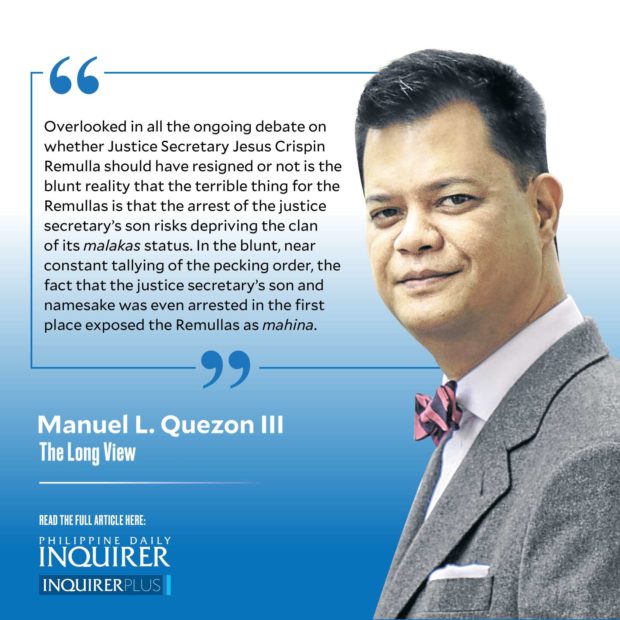Weakness at the top
Historian Mina Roces in 2001 defined “palakasan” as “a system wherein those in power compete with each other in obtaining special privileges and exemptions from regulations and bending the rules of law for their kinship group.”
It provides a useful lens through which to view our politics, in which, according to her, “various groups of family rivals all attempting to exercise power in the pursuit of family wealth and privilege. Each family then tries to outdo the other in being ‘malakas.’” But one unable or unwilling to use power and influence to help one’s kith or kin then becomes a disdainful thing, “mahina.”
When it comes to palakasan, there is no room for nuance. Either you are malakas, or you are mahina. Overlooked in all the ongoing debate on whether Justice Secretary Jesus Crispin Remulla should have resigned or not is the blunt reality that the terrible thing for the Remullas (and even the President, who is their ally and patron) is that the arrest of the justice secretary’s son risks depriving the clan of its malakas status. In the blunt, near constant tallying of the pecking order, the fact that the justice secretary’s son and namesake was even arrested in the first place exposed the Remullas as mahina. There is hardly anyone unfamiliar with the many steps in what passes for our justice system, in which those with the means or the connections, or both, can intervene or find people to help.
That there was a drug operation; that in the operation, Remulla was caught; that having been caught, he was charged means a point of no return was reached not once but multiple times. Put another way, from the mounting of the operation, which had to have proceeded from some sort of tip-off, to the operation resulting in the media being told (I understand that tightened rules to prevent suspects being framed by the police means a media report is basically a requirement for judges to allow a case to proceed), there were instances where the identity of the suspect had to have emerged and been ignored by the police and the prosecutors.
While many in the public are upset that Juanito Jose Diaz Remulla III has received more considerate treatment than others receiving shipments of marijuana (he was given the ultimate courtesy of being left alive, to begin with; not to mention an epidemic of sensitivity about his appearance), that is nothing compared to the ultimate discourtesy and unfavorable treatment of being charged, which makes any legal hocus-pocus not only legally, but politically, much more difficult, if not outright impossible. Had the justice secretary actually had influence, this story would not have seen the light of day, or at least he wouldn’t have been charged.
We know from press reports that there have been interceptions, in the past, of “kush” (a type known for its sedative characteristics) coming from America. The ill-fated (for Remulla) package was one of those sent through the airport. The weight was reported to be 937 grams, which at the average American market rate of $319 a gram, means a value of $298,903 (the Los Angeles Times, for this kind of marijuana, cites the average joint at 0.3 grams and 0.5 grams for the average cookie). It would be reasonable to conclude that, being a package that came through the Ninoy Aquino International Airport, the tip-off could very well have come as much from international as domestic sources. A tip-off from overseas to the Philippine Drug Enforcement Agency (PDEA) would give individual agents very little wiggle room, however accommodating they might be inclined. A case of native influence wilting in the face of global power. Assuming a premium being put on good relations being maintained by PDEA or the police with their counterparts in other countries, of course.
While committed to using the resources of the republic to protect his predecessor, our current president has reportedly decided on a more humane approach to drugs. Veteran journo Glenda Gloria’s recently wonderfully sourced peek into the goings-on in the Palace reported that proof of this was the President’s choice of Philippine National Police chief, someone relatively untouched by the grisly policies of his predecessor. One of Gloria’s sources mentioned that when the body count of one cop was mentioned as a plus in determining his suitability for a plum post, the President brushed it aside. But for all this, Gloria also reported that it is “in the PNP and the armed forces where the Dutertes are well-entrenched.”
To borrow a phrase from our legislators, in the ruling coalition, could it ever be that interparliamentary courtesy to coalition partners might no longer apply? If that were to be so, it would be a sign of a brash new era shocking to old-school political practitioners. But then again, the Remullas had backed former president Rodrigo Duterte, unless he somehow got sore when they backed Marcos for the presidency (meaning the tandem the former president didn’t want). After all, which other ex-president might possibly have any residual or actual influence behind the scenes in our current government? Name one.
Perhaps it’s because pecking-order-spotting has been the name of the game to an extreme degree lately, that the palakasan element of the justice secretary’s family woes seems to be one crying out to be confronted. The coalition is not so solid that the desirability of the President’s relinquishing the agriculture post isn’t taboo. Not to mention dark mutterings about the First Lady that would make Medusa blush. And all expressed and amplified within the online ecosystem of the ruling coalition. As that useful old saying goes, just because you’re paranoid doesn’t mean they aren’t after you.
Email: mlquezon3@gmail.com; Twitter: @mlq3





















